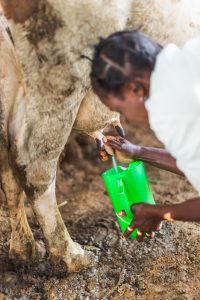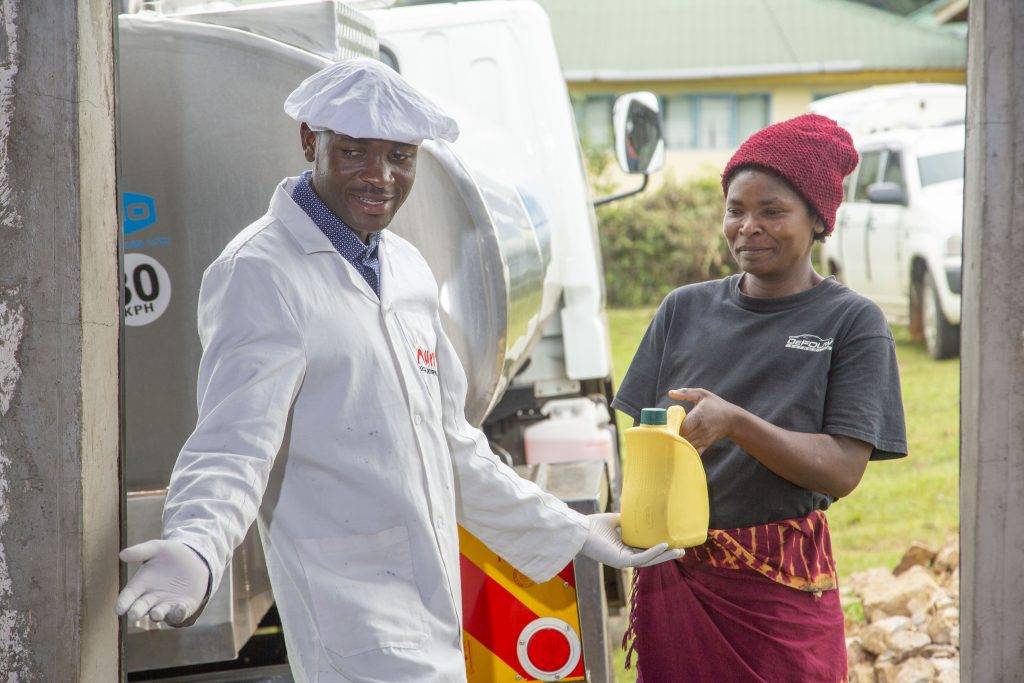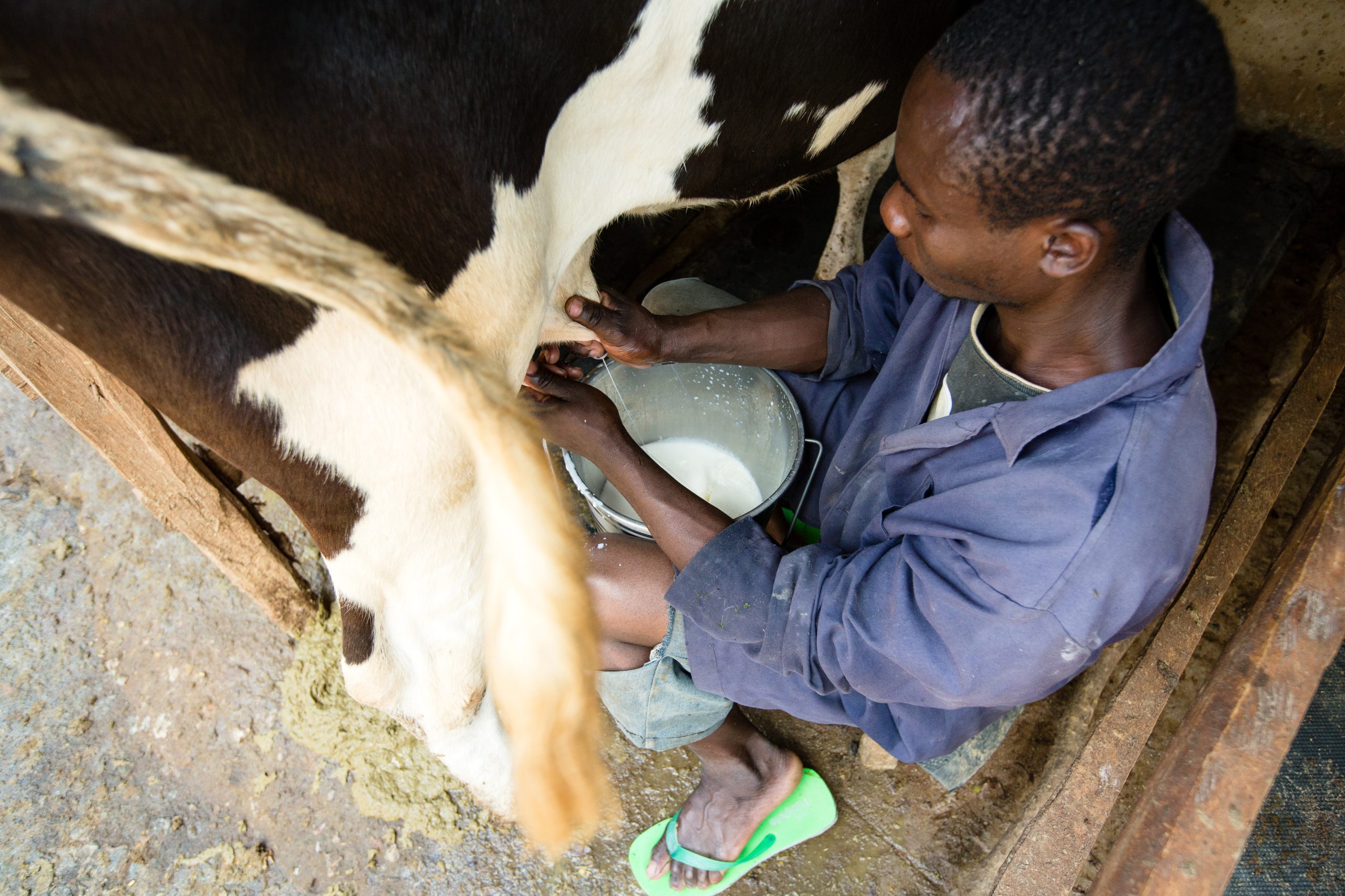Nuru Kenya launched its rural livelihoods program in 2017 with dairy cattle in Migori County, Kenya. Through the rural livelihoods program, Nuru Kenya aims to increase milk yields and incomes for farmers. Nuru Kenya’s recently released dairy impact report details the significant achievements of this program over the last five years and the difference it has made for farmers.
Introducing Christine Boke
When Isebania Farmers’ Cooperative Society was formally established in 2016 by Nuru Kenya, there was some uncertainty in the community around the cooperative model, as the concept was new in the area. Christine, a young woman farmer, was an early registrant in the cooperative, eager to learn how she could improve her maize (corn) and bean harvest. At the time, Christine lacked quality seeds. Additionally, she needed valuable planting and harvesting information that takes into account the changing climate. Christine was harvesting less than five bags of maize per acre.
Through her cooperative, Christine gained access to a variety of training sessions on best practices for maize production, post-harvest handling practices, and cooperative management. By utilizing the knowledge she gained from the training sessions and the improved inputs, Christine was able to increase her maize production from less than five bags to 17 bags harvested per acre (a 240% increase)! 17 bags are more than 3,300 pounds of produce. After keeping what she needed for her household, Christine sold the surplus through her cooperative, leading to increased income that provided enough money to cover household expenses.
Women’s Empowerment through Livestock

Kenyan dairy farmer, Mary Joel, milking cow, 2019
Women like Christine are more likely to be impacted by major global injustices, including poverty and food insecurity. Yet, women farmers have unequal access to the finances and inputs that make their work, and ultimately, their opportunity to overcome poverty and hunger, possible. Empowering women with access to income and decision-making opportunities provides significantly better results for them, their households, and their communities. Nuru is committed to a gender transformative approach that focuses on engaging women and championing their leadership.
Agrilinks notes that, “women make up almost two-thirds of the world’s 600 million low-income livestock keepers. Evidence has shown that empowering women leads to healthier communities, animals and environments. Investing in gender-equitable livestock production in [Low and Middle Income Countries] will lead to more economically and climate-resilient agricultural systems, increase the availability of nutritionally rich animal-source foods in vulnerable communities, and restore ecosystems globally” (Agrilinks).
Addressing the Program Gap
The dairy livelihoods program was established to address a critical need for farmers like Christine in the rural communities of Migori and Homa Bay Counties. These smallholder farmers needed to be able to shift away from total reliance on seasonal income from crop sales. As smallholder farmers are disproportionately impacted by the effects of climate change, the necessity for diversified livelihoods is increasingly clear. When weather is extreme, impacting crop harvests and ultimately income, farmers are able to have continued income through dairy livelihoods. FAO notes that “livestock contributes 40% of the global value of agricultural output and supports the livelihoods and food and nutrition security of almost 1.3 billion people” (FAO).
Nuru Kenya promotes best practices for farmers to follow, supporting improved milk production and health of animals. Through farmer cooperatives, Nuru also offers training on fodder production and artificial insemination. Dairy inputs are disbursed on loan and coupled with training and extension services. As members of cooperatives, households repay their loans and increase on-farm income. This enables them to better cope with economic shocks. The cooperatives redistribute loan repayments as a revolving fund that members can access to support local economic growth.
Christine Boke & Dairy Farming
Christine joined the dairy program when it was introduced through Isebania Farmers’ Cooperative. When she first joined the dairy program, Christine had one zebu cow–a breed local to Isebania–that produced 3 liters of milk per day. She received training on growing improved fodder for her cows, managing her business, appropriate healthcare and vaccinations for her dairy cow, and proper milk storage. The training was intended to support Christine and the other dairy farmers in producing quality milk.
In addition to learning improved livestock farming practices and basic business management, Christine also learned about market linkages–how farmers connect to their buyers and input providers. With this training, Christine purchased an improved heifer breed and was able to get 8 liters of milk per day (nearly three times the amount of milk she was getting before). The knowledge gained from the training has equipped Christine to sell her milk through the cooperative, and this additional income has helped her save money to cover household expenses. Her milk sales, combined with those of her fellow farmers, has also enabled the cooperative to grow.
Dairy Impact Report
Since Nuru Kenya launched the dairy program in 2017, the country has faced substantial challenges, including climate change impacts, political instability, and the COVID-19 pandemic and its resulting inflation. Despite these challenges, for five consecutive years, farmers in Migori County increased their dairy yields. Not only can these yields be sold to increase household income, but the milk is vital for household nutrition, as alternative sources of calcium and protein are limited.

Kenyan woman dairy farmer selling milk, 2022
The Nuru Collective partners with the Ray Marshall Center, an applied research and policy institute, to better understand program outcomes and impacts. This report takes a look at the impact of Nuru Kenya’s dairy program, with data in Migori County stretching back to 2017, and new data becoming available this year in Homa Bay County, Kenya. To track, the Nuru collects and analyzes data across programs using select survey and analysis methods.
Hear more about the dairy program from Nuru Kenya Managing Director Pauline Wambeti by watching the video below. A Nuru Kenya leader for over a decade, Pauline championed the launch of the program to better help farmers and their families adapt and overcome. Though climate change effects will continue interrupting farmer livelihoods, Pauline and the Nuru Kenya team are eager to support ongoing adaptation efforts.


